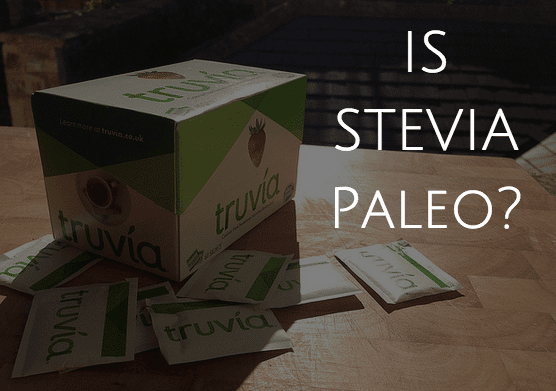Table of Contents
The Quick Answer
Yes. Stevia is paleo.
Why Is Stevia Paleo?
Stevia, a natural sweetener derived from the leaves of the stevia rebaudiana plant, is paleo (in its natural, unprocessed form) because it’s a food found in nature that has been eaten by people throughout history. High quality stevia is thought to have some trace nutritional benefits. It is certainly far less harmful than regular cane sugar and other processed sweeteners.
To date, no studies have shown any downside to consuming stevia. Some research even shows that it can help to balance blood sugar levels and regulate insulin.
We know that humans have always eaten a wide range of plants and that humans are naturally drawn to sweetness, so it’s highly likely that cavemen did consume the sweet leaves of stevia plants when they had access to them, although they probably did this in moderation and varied the different plants that they ate.
The kind of stevia that is sold today in most supermarkets is mostly very processed, contains isolated stevia extract, and is devoid of most of the nutrient that stevia contains in its raw form. Today, stevia is usually found in powder, liquid extract, and crystalized forms and is sold in individual packets and small bottles.
This is far from how stevia occurs in nature, as a plant. The safest and most natural type of stevia comes directly from the plant’s leaves and looks similar to a dried herb. It’s greenish in color and resembles a plant leaf. This is sold online and in some health food stores, but it’s not very often seen in ordinary supermarkets, so be careful about which kind of stevia you purchase when you’re shopping. Look for stevia that’s labeled “organic” and that contains no added ingredients.
While regular white cane sugar is processed and harmful to blood sugar and insulin levels, and negatively impacts our moods and energy levels, natural stevia can be enjoyed in moderate amounts without causing any problems for most people.
Using a small amount of stevia extract in place of more refined and processed forms of sugar (including things like white cane sugar, beet sugar, high-fructose corn syrup, agave nectar, brown rice syrup, and barley malt) is a good way to lower the amount of sugar you consume. However, like all things, it’s best to consume stevia in moderation and not multiple times per day, particularly considering the fact that there hasn’t been much research carried out on the long-term effects of consuming it.
Why There’s Confusion
Some people consider stevia to be processed and somewhat artificial. Certain paleo followers choose not to include any sweeteners in their diet because they feel they’re unnecessary and that they contribute to cravings for sweet things.
There are also people who feel that more long-term research on stevia needs to be carried out before we can decide that it’s safe. While there isn’t any evidence showing that stevia is harmful, some people have chosen to stay away from it until we know more about how it really affects us.
So, Is Stevia Paleo?
Yes, stevia is paleo. Stevia is thought to have been eaten since cavemen were around. It’s a natural sweetener (when bought in its unprocessed form) and it doesn’t look like it has any harmful effects on the human body (whereas white cane sugar and artificial sweeteners do). It may even bring with it some health benefits.
How To Know What Is And Isn’t Paleo
Check out Paleo.io, the mobile app that answers the question, “is __ paleo?” Paleo.io comes with the most comprehensive paleo diet food list out there, so no matter which food you’re confused about, you’ll always be able to find out whether or not it’s paleo.
How To Consume Less Sugar
If you’re concerned about the amount of sugar that you’re consuming, consider completing The 21-Day Sugar Detox. You can read our review of it here.
Photo credit: Health Gauge
